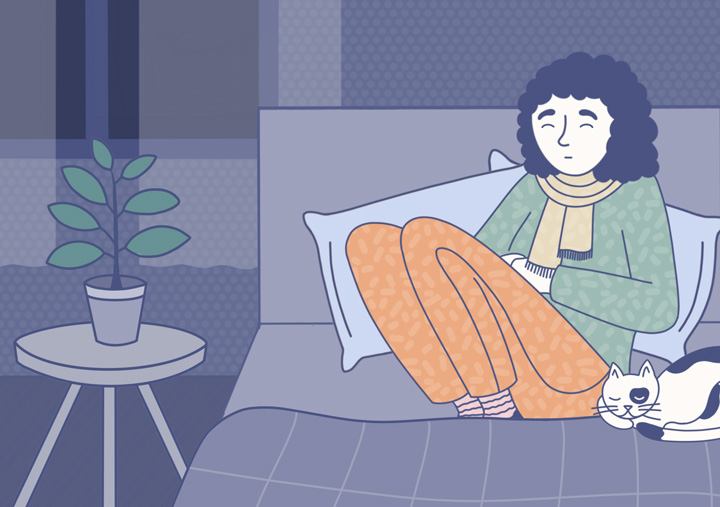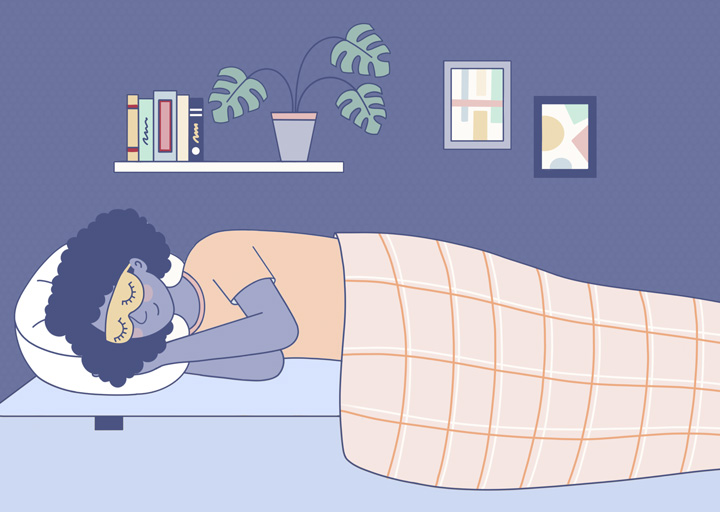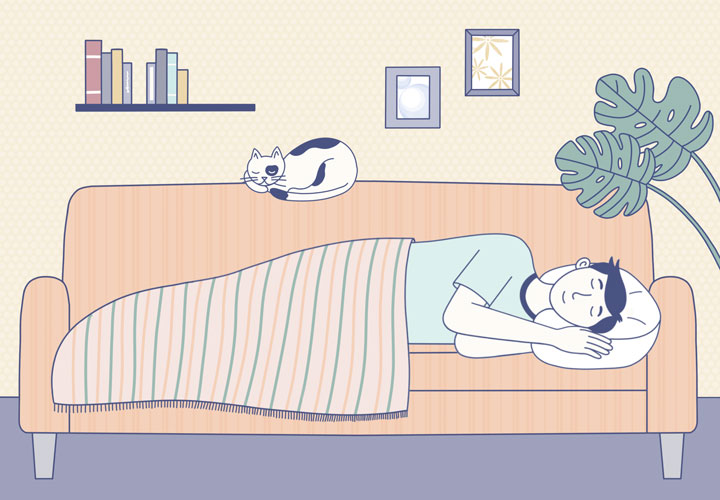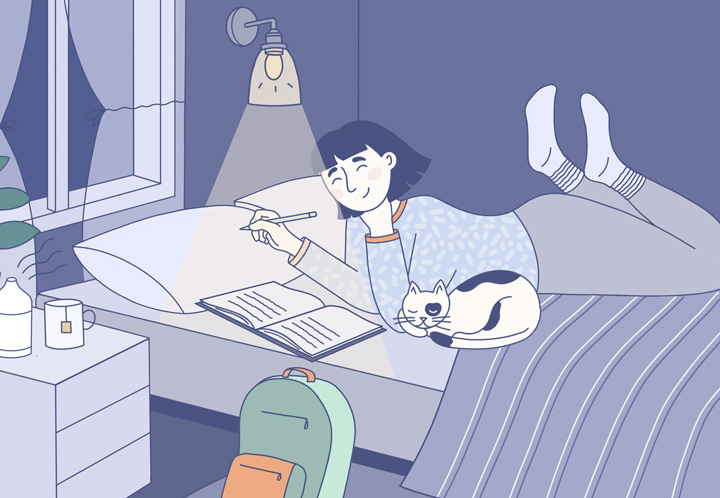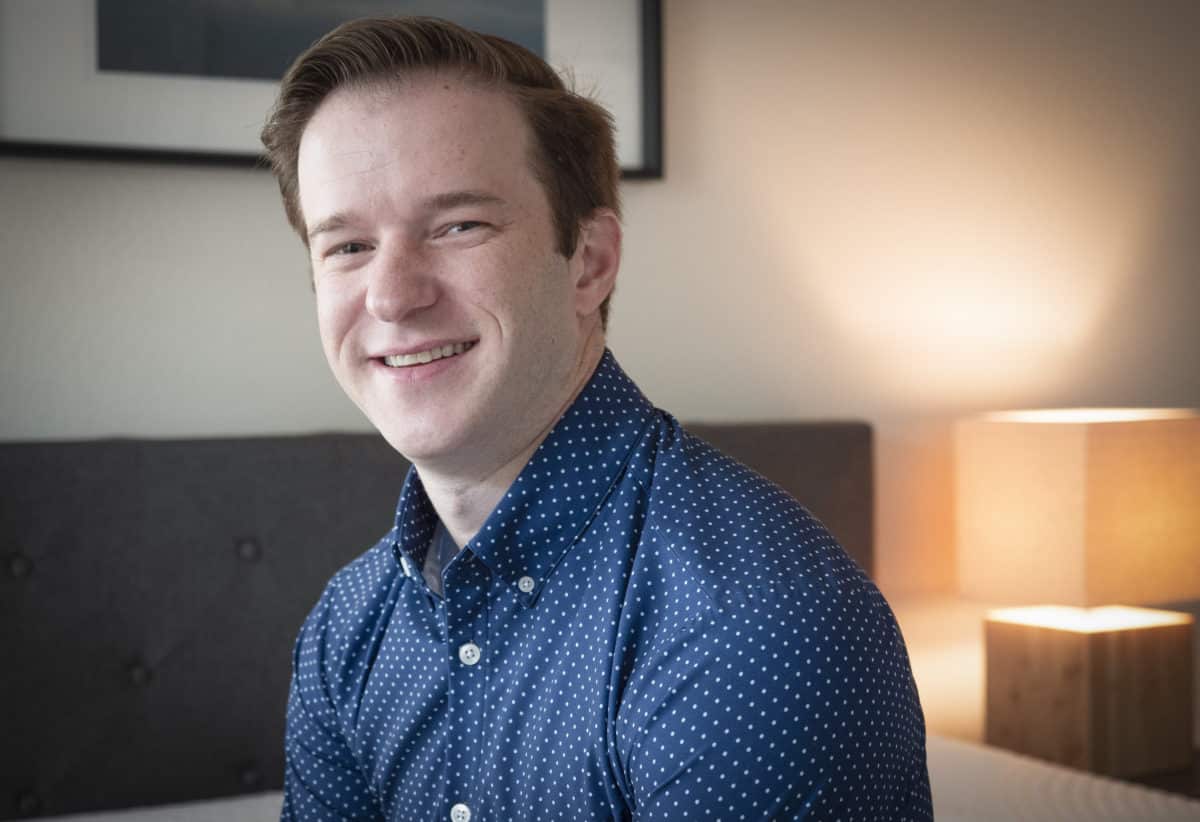Making sure your kids get enough sleep is crucial for their health and wellbeing, and it takes more than setting your kid up with one of the best mattresses for teenagers. When your children are young, it’s relatively easy to schedule regular naps and enforce early bedtimes to increase the odds that your child enjoys adequate rest. But as kids turn into adolescents, it can be tough to ensure your teenager gets enough sleep.
As any parent of an adolescent can tell you, teenagers have minds of their own. What’s more, they tend to have busy social lives, demanding academic schedules, and commitments to extracurricular activities that can take up lots of time and limit your teenager’s ability to get enough sleep.
That’s bad news, because teenage bodies have an intense need for rejuvenation. Teenagers’ brains and bodies are still developing, which means they have higher sleep needs than adults. And when teens don’t get enough sleep, it can result in several negative repercussions.
So what’s a concerned parent to do? Here’s what you need to know about how much sleep a teen needs — plus how to help your teen get sufficient rest each night.
How Much Sleep Do Teenagers Need?
 Teenagers need more sleep than adults and even preteens.
Teenagers need more sleep than adults and even preteens.
The American Academy of Sleep Medicine (AASM) recommends that teens ages 13 to 18 get 8 to 10 hours of sleep each night, compared to 7 to 9 hours for adults and 9 hours for preteens.
Why do teens need so much sleep? Put simply, it’s because they are growing — both mentally and physically. “Teenagers are going through a second developmental stage of cognitive maturation,” the Johns Hopkins site explains. “Additional sleep supports their developing brain, as well as physical growth spurts.”
Unfortunately, many teens are not getting the minimum recommended amount of sleep on an average night.
According to Nationwide Children’s Hospital, teens usually get an average of between 7 and 7.25 hours of sleep each night. This is notably less than the recommended nightly amount of eight to 10 hours.
In a 2016 study, the Centers for Disease Control and Prevention (CDC) analyzed data from 50,370 high school students in grades 9 through 12. They found that 69 percent of the respondents had fewer than eight hours of sleep on an average school night.
What Do Teenagers Think About Sleep?
According to a recent survey, young adults aged 18 to 24 had a different approach to sleep than many older people. Only 38% of young adults were likely to follow a set bedtime, compared to 47% of people over age 25. Despite this, young adults got more sleep than their older counterparts — an average of 7.2 hours per night, compared to an average of 6.9 hours for people over 25.
Young adults also felt guiltier about bad sleep habits than older generations (35% versus 26%) and were more likely to have taken steps to improve their sleep than older generations (86% versus 75%).
Why Are Teenagers At Risk For Insufficient Sleep?
There are a number of factors that put teenagers at risk for insufficient sleep.
Developmental factors play a big role.
In adolescence, teens’ biological clocks shift in a way that makes it tough to get enough sleep. Specifically, teens undergo a shift in their circadian rhythms that changes their internal clocks. The result is that teens are naturally inclined to go to sleep later.
“After puberty, there is a biological shift in an adolescent’s internal clock of about 2 hours, meaning that a teenager who used to fall asleep at 9:00 PM will now not be able to fall asleep until 11:00 PM,” the Nationwide Children’s Hospital website explains. “It also means waking 2 hours later in the morning.”
Teens might not be able to fall asleep early — and they also can’t sleep in late on most mornings of the week, because middle and high schools typically start early in the morning. When you pair late bedtimes with early school start times, that’s a recipe for sleep deprivation.
Other factors are behavioral. 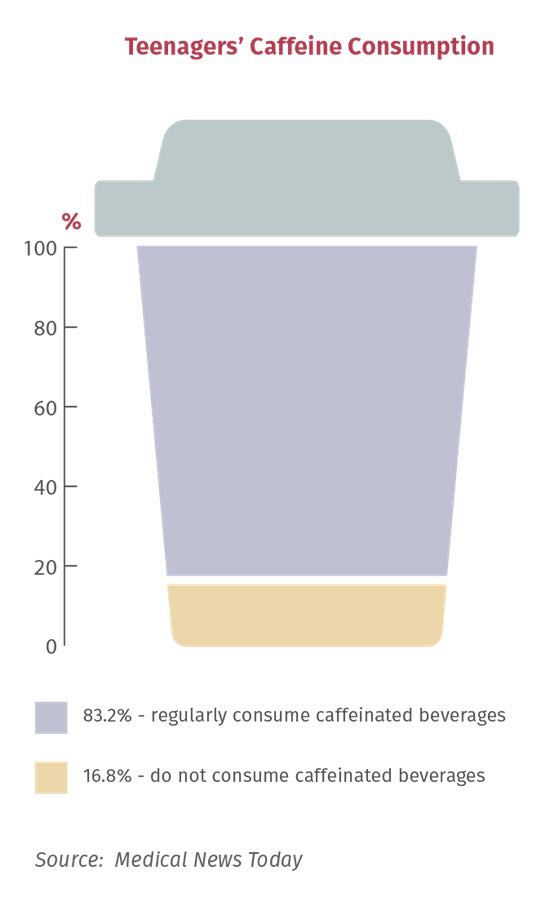
- Teens might be drinking a lot of caffeine that will keep them up at night. According to Medical News Today, 83.2 percent of teenagers regularly consume caffeinated beverages such as coffee, tea, soda, and energy drinks. The Mayo Clinic recommends that teens consume a maximum of 100 mg of caffeine per day — and as Medical News Today reports, a single 8-ounce cup of coffee contains anywhere from 95 to 200 mg of caffeine. It doesn’t take much for a teen to consume well over the recommended limit, which can interfere with their ability to fall asleep at night.
- Teens may be under pressure to juggle school work and extracurriculars, leading to packed schedules that prevent adequate time for sleep. Many teens have extremely busy schedules due to schoolwork and extracurricular activities, meaning they have to stay up late and/or get up early in order to get everything done. Some teenagers play sports and may have practice or games multiple times a week. Kids who are in the performing arts may be required to attend rehearsals or perform in late-night recitals and shows. Volunteering can also be time-consuming, and kids who have after-school or weekend jobs have to balance working with homework and other activities. Studying for tests and working on college applications can also take up hours each night.
- Teens who spend a lot of time on their phones, laptops, or tablets using social media may have trouble falling asleep at night, leading to sleep deprivation. A report from 2015 found that teens spend an average of nine hours a day looking at screens, including 2 hours and 42 minutes looking at a smartphone. “Electronics emit a glow called blue light that has a particular frequency,” the Child Mind Institute explains. “When it hits receptors in the eye, those receptors send a signal to the brain that suppresses the production of melatonin and keeps kids from feeling tired. And adolescents are low on melatonin and start producing it later to begin with.”
Mental health factors may also be at play.
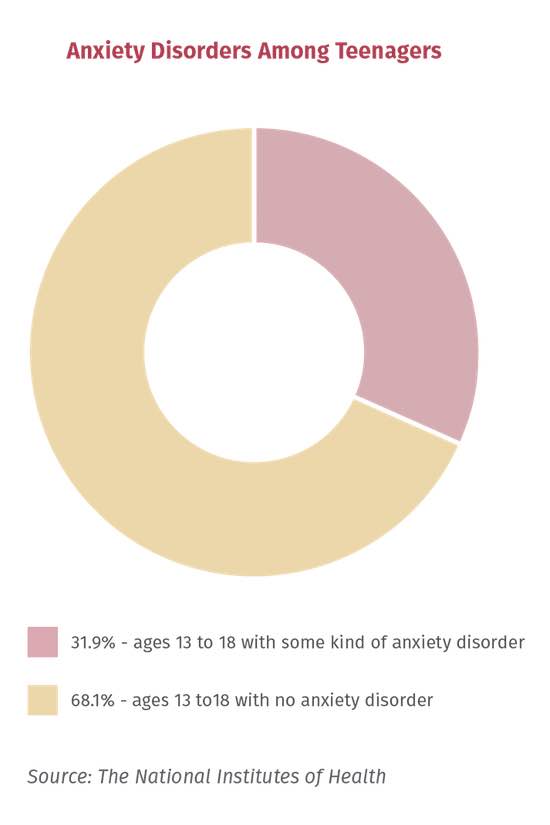 Anxiety and depression are fairly common among teenagers, with the National Institutes of Health reporting that 31.9 percent of teens ages 13 to 18 have some kind of anxiety disorder and 12.8 percent of 12- to 17-year-olds have experienced at least one major depressive episode. Either of these conditions might provoke insomnia, thereby diminishing a teen’s chances of enjoying adequate sleep.
Anxiety and depression are fairly common among teenagers, with the National Institutes of Health reporting that 31.9 percent of teens ages 13 to 18 have some kind of anxiety disorder and 12.8 percent of 12- to 17-year-olds have experienced at least one major depressive episode. Either of these conditions might provoke insomnia, thereby diminishing a teen’s chances of enjoying adequate sleep.
Speaking of mental health? This probably won’t come as a surprise, but teens who are being bullied may struggle with sleep. According to the National Bullying Prevention Center, 20.8 percent of 12- to 18-year-old students are victims of bullying. The CDC reports that bullied teens are at an increased risk for sleep difficulties as well as anxiety and depression.
Academic stressors can also keep teens up late at night.
Academics can cause sleep deprivation in multiple ways: either by causing teens to stay up working on homework until the wee hours of the morning or by causing stress that interferes with sleep.
Homework definitely causes stress for many teens. A 2015 Princeton Review survey found homework was the biggest cause of stress for 25 percent of teenagers, followed by grades (18 percent) and a desire to do well in school (17 percent).
For most teens, acute or chronic sleep deprivation can be explained by physiological, behavioral, lifestyle, or mental health factors. But in some cases, a teen’s sleep deprivation may be the result of a bona fide sleep disorder. We’ll touch on those in the next section.
Common Sleep Disorders Among Teens
It’s possible that a teenager who isn’t getting enough sleep is suffering from a sleep disorder. Some of the most common sleep disorders among teens include:
- Insomnia. According to the National Center for Biotechnology Information (NCBI), insomnia may be caused by a range of factors including anxiety, sleepwalking, nightmares, alcohol use, sleep apnea, and snoring. As noted above, teens who are prone to anxiety may also be more at risk for insomnia.
- Nightmares. Nightmares are completely normal, but they can cause sleep problems. The frequency of nightmares doesn’t matter, but if they regularly disrupt sleep, or if they are so disturbing that your teen can’t stop thinking about them after they have woken up, that can signal an issue. According to the Mayo Clinic, teenage girls are more likely to experience nightmares than teenage boys.
- Sleep apnea. Sleep apnea — a common condition that occurs when a person’s breathing stops for brief periods during sleep — can cause excessive daytime sleepiness in teenagers.
If you suspect your teenager has a sleep disorder, talk to them about it and help them make a doctor’s appointment to get checked out.
The Consequences Of Sleep Deprivation In Teens
Teenagers who are sleep deprived may find themselves struggling with mood swings, health issues, and other negative effects. Here are just a few of the consequences related to sleep deprivation in teens.
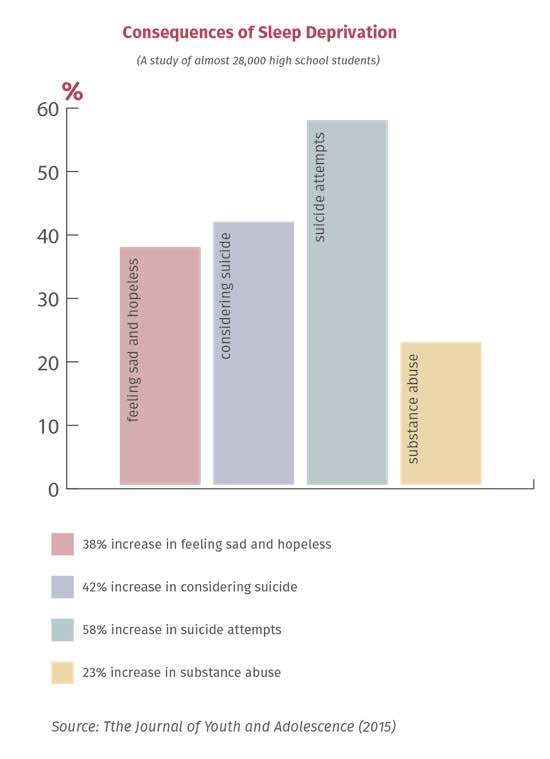 Sleep deprivation may lead to mental health issues and risky behavior.
Sleep deprivation may lead to mental health issues and risky behavior.
A 2015 study of almost 28,000 high school students, which was published in the Journal of Youth and Adolescence, found mental health issues are a common consequence of sleep deprivation. Scientific American reports: “Each hour of lost sleep was associated with a 38 percent increase in the odds of feeling sad and hopeless, a 42 percent increase in considering suicide, a 58 percent increase in suicide attempts and a 23 percent increase in substance abuse.” Sleep deprivation is also linked to an increase in risky behavior among teens.
Sleep deprivation is linked to poorer academic performance.
“Recent studies have shown that adequate sleep is essential to feeling awake and alert, maintaining good health and working at peak performance,” an AASM press release explains. “After two weeks of sleeping six hours or less a night, students feel as bad and perform as poorly as someone who has gone without sleep for 48 hours. New research also highlights the importance of sleep in learning and memory. Students getting adequate amounts of sleep performed better on memory and motor tasks than did students deprived of sleep.”
Sleep deprivation is also connected to declines in athletic performance.
“Missing small amounts of sleep may not make or break your marathon time”, says sleep disorder specialist Ralph Downey III, Ph.D. in an article for Cleveland Clinic.
“Even for a weekender who runs a 5K and has sleep loss, their time may decrease by a couple of minutes, which can make a big difference in how you place in a race,” Downey III says in the article. “Or a change in free throws by 1% may make the difference in your team winning or losing a game.”
Sleep deprivation has been linked to weight gain.
Rise and Shine, the Children’s National Health System site, explains: “There’s a higher risk for obesity and poor metabolic regulation. The regulation of hormones and enzymes that help process fat and sugar are intricately linked to the optimal timing of the sleep period and sleep stages.”
Sleep-deprived teens may be more likely to drive while sleepy, putting them at a higher risk for accidents.
According to the New York Department of Health, teens and young adults are at a high risk for drowsy driving, especially because they have less driving experience than adults and may not recognize that they’re too tired to drive. Meanwhile, a study from 2010 concluded that poor sleep and feeling sleepy behind the wheel increase the risk of teens having car accidents.
Sleep deprivation can have a variety of cognitive effects.
In a blog post, sleep specialist Dr. Michael Breus explains that poor sleep can lead to slower reaction times, trouble making and storing memories, decreased creativity, and impaired judgment and decision-making skills.
Sleep deprivation is linked to unsafe sexual practices.
Chronically sleep-deprived teenagers may be more likely to practice unsafe sexual activities than teens who obtain adequate sleep, suggests a new study. Those unsafe sexual behaviors might include having sex under the influence of alcohol or drugs or not using condoms.
“Insufficient sleep may increase the potential for sexual risk-taking by compromising decision-making and influencing impulsivity,” Wendy M. Troxel, a senior behavioral and social scientist and lead author of the study, said in a press release. Mattress Clarity reached out to the study’s authors for comments and was referred to said release.
The Role Of School Start Times In Teenage Sleep
As discussed earlier in this piece, middle and high schools tend to start quite early in the morning. These start times mean that teens often have to wake up early to make it to class on time. According to the Centers for Disease Control, early school start times are a major contributor to sleep deprivation in teens.
Data confirms that early school days might be inhibiting teens’ sleep. According to the American Academy of Sleep Medicine, “68.4% of United States high school students sleep 7 hours or less on school nights, while only 23.2% sleep 8 hours, 6.0% sleep 9 hours, and 2.4% sleep 10 hours or more.”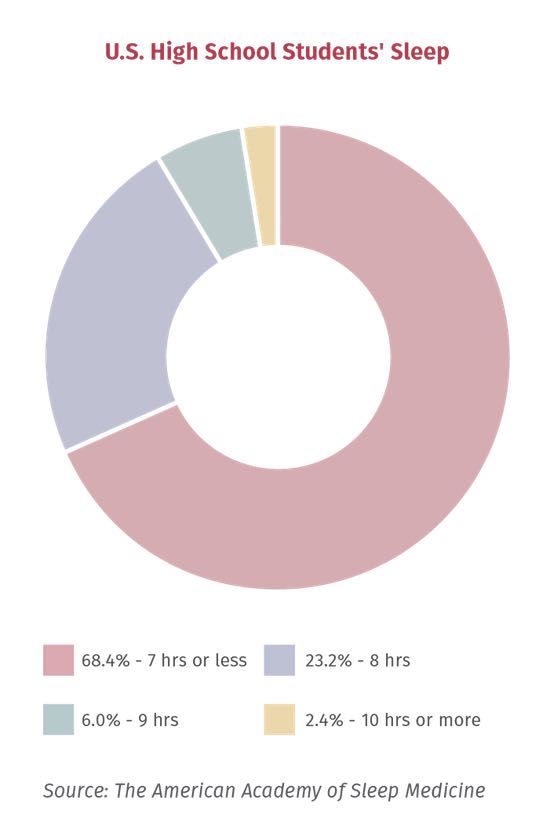
The American Academy of Pediatrics recommends that middle and high schools start at 8:30 a.m. or later, but the 2014 School Health Policies and Practices Study found that 93 percent of American high schools and 83 percent of American middle schools start earlier than 8:30 a.m.
The AASM advocates that middle and high schools should start at 8:30 a.m. or later for several reasons:
- This would allow teens to get enough sleep on school nights (or at least increase the odds of teens getting enough sleep).
- It would enable teens to feel more alert in the classroom, helping them reach their full academic potential.
- A later start time could reduce tardiness and student absences.
- Later start times might also improve teens’ mental health and psychological wellbeing.
- It would also increase road safety by lessening the chances of teens driving while drowsy.
Research confirms that changing school start times can majorly impact how teens feel.
A 2018 study from the Sleep Research Society, which focused on an all-girls’ school in Singapore, tracked what happened when the school started 45 minutes later (at 8:15 a.m. rather than 7:30 a.m.). Students said they felt “more refreshed” during the school day, and also reported less depression and less sleepiness. The researchers concluded: “Delaying school start time can result in sustained benefits on sleep duration, daytime alertness, and mental well-being.”
Because of studies such as this one, the American Medical Association (AMA) also supports an 8:30 a.m. start time for schools.
“Sleep deprivation is a growing public health issue affecting our nation’s adolescents, putting them at risk for mental, physical and emotional distress and disorders,” AMA Board Member William E. Kobler, M.D. said in a 2016 press release. “Scientific evidence strongly suggests that allowing adolescents more time for sleep at the appropriate hours results in improvements in health, academic performance, behavior, and general well-being. We believe delaying school start times will help ensure middle and high school students get enough sleep, and that it will improve the overall mental and physical health of our nation’s young people.”
Another new study from the RAND Corporation suggests that starting middle- and high-school classes no earlier than 8:30 AM could have huge benefits. They predict that later school start times could contribute a staggering $83 billion to the U.S. economy within a decade because students who are better-rested will perform better in academics and professionally, and the later start time would cut down on the number of car crashes caused by sleep-deprived teens.
Signs That Your Teen Might Be Sleep Deprived
Once you understand the consequences of sleep deprivation in teens, you can also understand how important it is to keep an eye on whether your teen is (or is not) getting enough sleep.
A teenager who is not getting enough sleep is likely to display some or all of the typical signs of sleep deprivation. The American Academy of Sleep Medicine (AASM) says that someone who is sleep deprived may:
- Feel excessively sleepy during the daytime
- Feel irritable
- Lack motivation
- Feel anxiety
- Show symptoms of depression
- Struggle to concentrate
- Demonstrate longer reaction times
- Get distracted easily
- Have low energy
- Feel restless
- Display a lack of coordination
- Make errors more often
- Display forgetfulness
When it comes to teenagers, these symptoms may manifest in unique ways. The National Sleep Foundation says that a sleep-deprived teenager may:
- Have trouble getting up for school in the morning
- Yawn a lot throughout the day
- Struggle to get out the door in the morning and/or get to class on time
- Rely on caffeinated beverages to make it through the day
- Be irritable, anxious, and easily angered
- Sleep in for at least two hours on the weekend
- Frequently take long naps
If your teen is demonstrating any of these symptoms, it may be a good idea to chat with them about their sleep habits.
How To Ensure Your Teen Gets Enough Sleep
If your teen seems to be sleep deprived on a regular basis, then it’s important to intervene before the symptoms of sleep deprivation become chronic. But this can be easier said than done. It can be hard to find a solution to teen sleep deprivation, especially if your teenager has a packed schedule with many school and/or extracurricular responsibilities. Nevertheless, there are several strategies you can try to help your teen get more sleep.
Help your teen develop and maintain good sleep hygiene habits.
This will make it easier for them to get regular, good-quality sleep. Recommended sleep hygiene habits include going to bed and waking up at the same time every day; sleeping in a cool, dark, and quiet room; putting screens away before bed; and practicing a relaxing bedtime routine. Work with your teen to troubleshoot any issues that might get in the way of good sleep hygiene. For example, if they’re easily woken up by street noise, you can buy them a white noise machine or a great pair of earplugs.
Encourage short daytime naps.
According to the Johns Hopkins website, a 35- to 45- minute nap before dinner can help teens feel more rested. “This is a better fix for sleep deprivation in teens than sleeping in, which throws off their body’s sleep cycle,” the site explains.
Consider keeping screens out of the bedroom.
It’s likely your teen will need to use a computer to do homework at night. But when bedtime hits, consider storing your teen’s phone, laptop, and any other electronics out of their bedroom. Give them an alarm clock that is separate from their phone so their bedroom can be an electronic-free zone (and so they can avoid the temptation of scrolling through Instagram when they should be asleep).
Maintain a strict curfew on school nights.
While reinforcing a curfew might lead to some tense exchanges with your teen, it’s important to ensure they arrive home with plenty of time to complete their homework and get to bed at a reasonable hour. This simple behavioral shift makes it much more likely that your teen will actually get the sleep they need.
The Bottom Line On Teenage Sleep
Experts recommend that teenagers get eight to 10 hours of sleep each night, but research shows the average teen is not even reaching the minimum side of that range.
Teens struggle to get enough sleep due to a number of factors, including changes in their biological clocks, packed schedules, caffeine consumption, and excessive screen time. Plus, early school start times mean adolescents often have to get up very early to make it to class on time — no matter when they fell asleep.
Sleep deprivation can provoke a number of negative consequences. It may make teens moody and irritable, impair their concentration, diminish their athletic performance, worsen their academic performance, and put them at increased risk for accidents while driving.
If you think your teen is sleep deprived (whether because they’re exhibiting symptoms of sleep deprivation or because you notice they’re not clocking enough hours in bed), it’s important to broach a conversation about sleep. Then take any steps possible to help your teen get more sleep each night.
[Editor’s Note: The content provided on this site is for general informational purposes only. Any information provided is not a substitute for professional medical advice. We encourage you to consult with the appropriate health expert if you have concerns.]
Featured image: Sabphoto/Shutterstock


